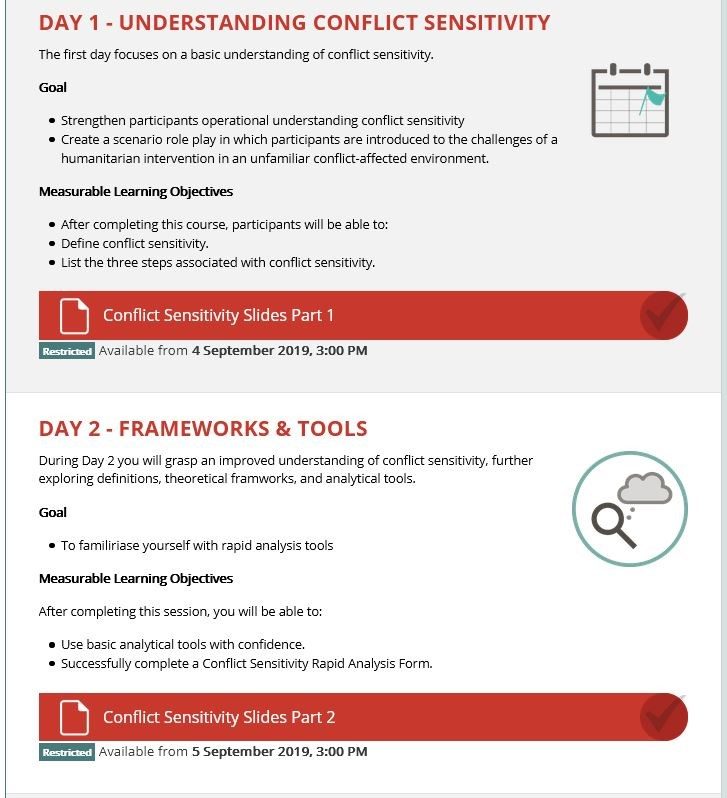A case from the community
Enhancing conflict sensitivity through blended learning
DanChurchAid (DCA) recently launched a Conflict Sensitivity workshop blending online learning with in-person training. Find out how the design team used different formats to encourage knowledge exchange and application of newly acquired understanding of conflict sensitivity training.
A recent spike in violent conflict experienced by DCA country offices and partners led to DCA’s Copenhagen-based Conflict Prevention & Peacebuilding Advisor to experiment with a novel approach to learning. Country offices sought technical assistance on how to Do No Harm, Do Some Good and, where possible, contribute to local peacebuilding.
"The idea is not to replace in-person training, but to enhance it," says Sunra Baj-Lambert, DCA's Prevention and Peacebuilding Advisor.
The main challenge was to devise effective Conflict Sensitivity training in just three days, in which participants would be encouraged to not only use but also incorporate what they had learned into their workstream. So, together with the Fabo Learning Lab, a training design team devised a comprehensive blended learning package consisting of a workshop accompanied with an online learning component.

First off, an interactive learning Fabo site was created for participants to register before the start of the in-person training. The Fabo site encouraged participants to familiarise themselves with the course content, meet other participants, access learning goals, and receive additional information about the course.
Then, over three days, learners experienced face-to-face sessions consisting of a roleplay scenario coupled with sessions on conflict sensitivity rapid analysis. An optional online test and coursework assignment were also made available via the online Fabo platform for those interested in learning more. Successful attendance of the workshop, alongside online completion of the test and coursework submission, enabled participants to obtain a course certificate (valid for three years).

“The idea is not to replace in-person training, but to enhance it,” said Sunra Lambert Baj, the Conflict Prevention & Peacebuilding Advisor and one of the DCA staff working on the training design.
“The blended learning format propels learning beyond the narrow time-bound confines of the training venue. It acts as a live extension of the session where participants are actively encouraged to continue learning, provide course feedback, access workshop material, replicate session plans, and revisit learning resources,” he continued.
A blended learning approach meant that learners could also reach out to the training design team, and each other, via the Fabo platform to exchange ideas long after the in-person training component had ended.

The blended learning approach was first piloted in Central African Republic in 2019. Having received largely positive feedback, the course was further refined and then followed up with subsequent sessions in Mali, South Sudan, and the Democratic Republic of Congo.
Despite the challenge of unstable internet access in many of the training locations, most learners were still able to get online to complete the optional test and coursework, as well as interact with additional online components. Upcoming workshops are tentative for MENA and Horn of Africa regions in 2021.
Suggestions and learnings from the design team:
- Consider allocating enough time to design and test run both the online Fabo learning site and the interface with the in-person training component.
- It could be helpful to send the Fabo site out to participants at least a week in advance of the in-person session. Allow time for learners to address any technical or connectivity issues, as well as acquaint themselves with the platform content.
- Pilot the approach and refine the methodology before rolling out.

